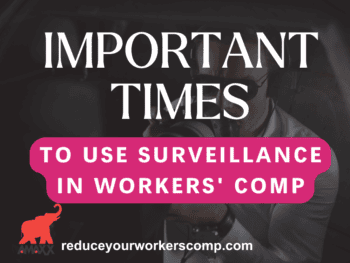Investigating a workers’ compensation claim can make all the difference in the outcome of a case. Claim handlers have a special role that can help resolve cases in a timely manner and at times may need to rely heavily on an investigation firm.
Why Should I Investigate?
Before a claim handler begins the investigative process, it is important to understand there are reasons why they are looking into the claim. Determining where you are procedurally can make the investigation more cost effective.
- Mitigating an accepted claim
- Defending a Potential Claim;
- Identifying Fraud; and
- Determining Other Necessary Parties to an Action
Click Link to Access Free PDF Download
“The 5Cs to Taking a Bulletproof Injured Worker Recorded Statement”
Determining Witnesses
Basic claims investigation will also allow you to determine witnesses. This will include fact or lay witnesses, as well as expert witnesses that may be necessary. Types of fact or lay witnesses include the following: managers or other supervisors, co-workers, on-site medical personnel, human resources staff, risk and safety managers and witnesses to the incident or injury.
Expert witnesses should be used at the discretion of a claims handler. Expert witnesses charge a fee for their services and may not be needed in all cases. Types of expert witnesses in a workers’ compensation claim include IME doctors, vocational experts and labor market surveys.
Other Sources of Documentary Evidence
Obtaining additional information about a claim is typically crucial in the early stages of a claim investigation. It is also important to know the law of the jurisdiction you are in as this will govern your ability to obtain information. For example, if an employee reports a work injury, claims management professionals are able to request authorizations for medical records. On the other hand, when a denial is made, the ability to access that same information may sometimes be only made once after a claim is put into litigation. State workers’ compensation acts and rules also govern employee statements, and access to other information.
Here is a list that claims handlers might want to access during a claims investigation:
- Authorization to obtain various records: medical, workers’ compensation division records, vocational reports, tax records (self-employment or multiple job wage earners), school records and unemployment records
- ISO Claims Bureau Search
- Maps and charts
- Police records
- Court records
- Medical records, bills and other expenses
- Child support obligations
- Internet or Social Media research
- Unemployment records
Other Sources of Information
It is also essential that the claims professional learns as much as they can about the employee’s work activities with the employer. In some cases it may be important to do the following:
- Videotape job site
- Videotape employee’s job (common in repetitive movement-type injuries)
- Security camera video
Questions of Admissibility
Just because you are able to find information, does not mean that it will be admissible at a workers’ compensation hearing. In order for a court to review evidence, it must be admissible. Rules regarding admissibility vary from state to state. The basic question most courts will ask is whether the evidence has probative value and is not overly prejudicial. Most states have relaxed rules of evidence in administrative settings. It is important to consult with an attorney on issues of evidence and admissibility.
Conclusions
Claims management teams are on the front lines when it comes to investigating a claim. Before handling any claim, it is important for a claims handler to understand what goals they are trying to accomplish and how to complete the task in an effective and timely manner.
Author Michael B. Stack, CPA, Principal, Amaxx Risk Solutions, Inc. is an expert in employer communication systems and part of the Amaxx team helping companies reduce their workers compensation costs by 20% to 50%. He is a writer, speaker, and website publisher. www.reduceyourworkerscomp.com. Contact: mstack@reduceyourworkerscomp.com.
©2014 Amaxx Risk Solutions, Inc. All rights reserved under International Copyright Law.
WORK COMP CALCULATOR: http://www.LowerWC.com/calculator.php
MODIFIED DUTY CALCULATOR: http://www.LowerWC.com/transitional-duty-cost-calculator.php
WC GROUP: http://www.linkedin.com/groups?homeNewMember=&gid=1922050/
SUBSCRIBE: Workers Comp Resource Center Newsletter
Do not use this information without independent verification. All state laws vary. You should consult with your insurance broker, attorney, or qualified professional.

























